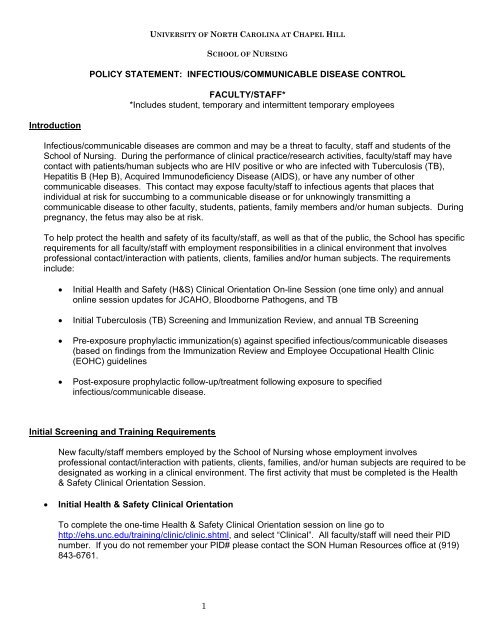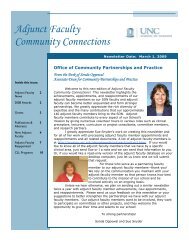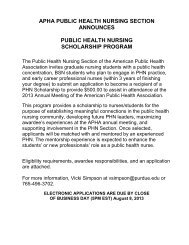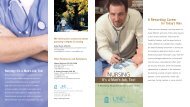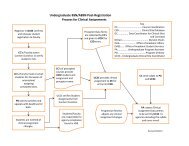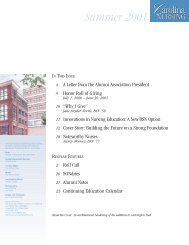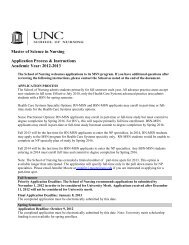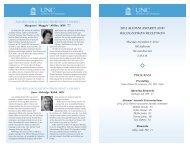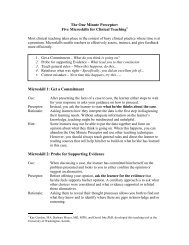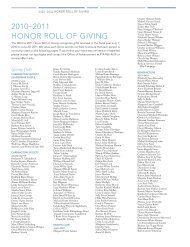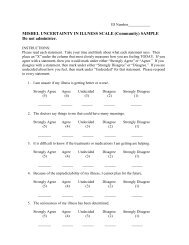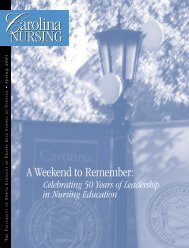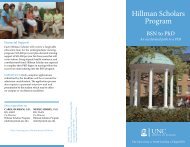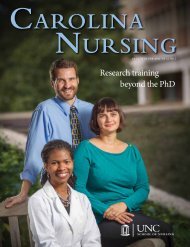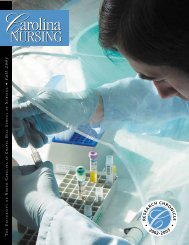Infectious and Communicable Disease Control ... - School of Nursing
Infectious and Communicable Disease Control ... - School of Nursing
Infectious and Communicable Disease Control ... - School of Nursing
You also want an ePaper? Increase the reach of your titles
YUMPU automatically turns print PDFs into web optimized ePapers that Google loves.
UNIVERSITY OF NORTH CAROLINA AT CHAPEL HILLSCHOOL OF NURSINGPOLICY STATEMENT: INFECTIOUS/COMMUNICABLE DISEASE CONTROLFACULTY/STAFF**Includes student, temporary <strong>and</strong> intermittent temporary employeesIntroduction<strong>Infectious</strong>/communicable diseases are common <strong>and</strong> may be a threat to faculty, staff <strong>and</strong> students <strong>of</strong> the<strong>School</strong> <strong>of</strong> <strong>Nursing</strong>. During the performance <strong>of</strong> clinical practice/research activities, faculty/staff may havecontact with patients/human subjects who are HIV positive or who are infected with Tuberculosis (TB),Hepatitis B (Hep B), Acquired Immunodeficiency <strong>Disease</strong> (AIDS), or have any number <strong>of</strong> othercommunicable diseases. This contact may expose faculty/staff to infectious agents that places thatindividual at risk for succumbing to a communicable disease or for unknowingly transmitting acommunicable disease to other faculty, students, patients, family members <strong>and</strong>/or human subjects. Duringpregnancy, the fetus may also be at risk.To help protect the health <strong>and</strong> safety <strong>of</strong> its faculty/staff, as well as that <strong>of</strong> the public, the <strong>School</strong> has specificrequirements for all faculty/staff with employment responsibilities in a clinical environment that involvespr<strong>of</strong>essional contact/interaction with patients, clients, families <strong>and</strong>/or human subjects. The requirementsinclude:Initial Health <strong>and</strong> Safety (H&S) Clinical Orientation On-line Session (one time only) <strong>and</strong> annualonline session updates for JCAHO, Bloodborne Pathogens, <strong>and</strong> TBInitial Tuberculosis (TB) Screening <strong>and</strong> Immunization Review, <strong>and</strong> annual TB ScreeningPre-exposure prophylactic immunization(s) against specified infectious/communicable diseases(based on findings from the Immunization Review <strong>and</strong> Employee Occupational Health Clinic(EOHC) guidelinesPost-exposure prophylactic follow-up/treatment following exposure to specifiedinfectious/communicable disease.Initial Screening <strong>and</strong> Training RequirementsNew faculty/staff members employed by the <strong>School</strong> <strong>of</strong> <strong>Nursing</strong> whose employment involvespr<strong>of</strong>essional contact/interaction with patients, clients, families, <strong>and</strong>/or human subjects are required to bedesignated as working in a clinical environment. The first activity that must be completed is the Health& Safety Clinical Orientation Session.Initial Health & Safety Clinical OrientationTo complete the one-time Health & Safety Clinical Orientation session on line go tohttp://ehs.unc.edu/training/clinic/clinic.shtml, <strong>and</strong> select “Clinical”. All faculty/staff will need their PIDnumber. If you do not remember your PID# please contact the SON Human Resources <strong>of</strong>fice at (919)843-6761.1
Initial Tuberculosis (TB) Screening <strong>and</strong> Immunization ReviewNew faculty/staff members employed by the <strong>School</strong> <strong>of</strong> <strong>Nursing</strong> should discuss their responsibilities withtheir Division Head or Principal Investigator/Project Manager <strong>and</strong> answer two questions: 1) Will the newemployee work in a healthcare facility or need a UNCH ID card? 2) Will the employee come in directcontact with blood? The answers to these two questions will be conveyed by the Division Head orPrincipal Investigator/Project Manager to the Human Resources Manager for appropriate follow up.If the answer to question #1 above is yes, then the faculty/staff member is required to contact theEOHC (966-9119) to schedule an appointment for an immunization history review, <strong>and</strong> determine ifanother TB screening is needed. The new employee must bring documentation <strong>of</strong> immunization historyto their EOHC appointment. If the employee has had a recent TB screening (within the past year)she/he can also bring the following documentation to their EOHC appointment: the date the TB skin testwas administered, date read, <strong>and</strong> the results. A deferral <strong>of</strong> the required immunizations <strong>and</strong> screeningfor medical reasons may be granted if written documentation from a health care provider is presentedto EOHC.If the answer to question #1 above is no, yet the employee will have potential exposure to patients orhuman subjects in home or community settings (but not in a healthcare facility), the following guidelinesapply. For new employees who are funded on grants or contracts (<strong>and</strong> not state funds) the <strong>School</strong> <strong>of</strong><strong>Nursing</strong> recommends that the program manager or Principal Investigator (or his/her designee) track theemployees’ immunization histories <strong>and</strong> annual TB screenings for their specific project. Frequently,employees have responsibilities on grants that require work in community settings, however, theymaintain employment in other health care settings where TB screening <strong>and</strong> up-to-date immunizationsare required. <strong>School</strong> <strong>of</strong> <strong>Nursing</strong> managers or investigators are responsible for maintaining records <strong>of</strong>TB screenings for their employees who do not work in a health care facility or have a UNCH ID card butwork with patients, clients, or human subjects in various community settings.In summary, Initial screening <strong>and</strong> training requirements are met when new employees complete theHealth <strong>and</strong> Safety clinical orientation, immunization review, <strong>and</strong> TB screening.Annual Screening & Training RequirementsFaculty/staff who answer “yes” to the question “Does the employee work in a healthcare facility or havea UNCH ID card?” need to complete the following screening <strong>and</strong> training requirements each year:Tuberculosis screening test (at EOHC)Tuberculosis Self Study Unit (on-line)Healthcare/JCAHO Worker General Safety Self Study Unit (on-line)Faculty/staff who answer “yes” to the question “Will the employee come in direct contact with blood?”need to complete the following training requirements each year:Bloodborne Pathogen Self Study Unit (on-line)All Self Study units can be completed on-line from the Health <strong>and</strong> Safety Website:http://ehs.unc.edu/training/self.shtml. Faculty/staff should send an email message to notify the SONHuman Resources Manager, Sharon@unc.edu, when these requirements are completed.2
Monitoring ComplianceA change in work assignment, from non-contact to contact, during the academic year should bereported by the appropriate Division Head/Dean to the Human Resources Manager, so the bi-monthlyHealth <strong>and</strong> Safety Compliance report can be updated. The Human Resources Manager shall requestthe completion <strong>of</strong> the appropriate annual screening/training by the faculty/staff to insure compliance.The UNC-CH Office <strong>of</strong> Health <strong>and</strong> Safety sends notices to continuing faculty/staff several weeks inadvance <strong>of</strong> the need to update required immunizations/testing including subsequent Hep B Vaccineinjections. The Office <strong>of</strong> Health <strong>and</strong> Safety maintains a current <strong>and</strong> accurate database <strong>of</strong> faculty/staffcompliance with SON health requirements. SON Human Resources Manager maintains a copy <strong>of</strong> theHealth <strong>and</strong> Safety Compliance Report <strong>and</strong> sends notices to faculty/staff when they have not completedthe initial requirements, or have fallen out <strong>of</strong> compliance. Faculty/staff may also contact the Office <strong>of</strong>Health <strong>and</strong> Safety website at http://www.ais.unc.edu/TrainingHistoryLookup/ to gain information abouttheir compliance status with the University health requirements by using their PID number.Faculty/staff with ongoing contact are required to complete the annual health <strong>and</strong> safety complianceprior to the expiration date <strong>of</strong> each requirement.Newly employed <strong>and</strong> continuing faculty/staff who fail to meet University <strong>and</strong> <strong>School</strong> <strong>of</strong> <strong>Nursing</strong> health<strong>and</strong> safety training <strong>and</strong> immunization requirements, shall be reported to the appropriate <strong>School</strong> <strong>of</strong><strong>Nursing</strong> administrator for follow-up action, shall be temporarily withdrawn from client contact untilrequirements are met, <strong>and</strong> the consequences <strong>of</strong> not meeting health <strong>and</strong> safety training <strong>and</strong>immunization requirements will be considered in the faculty/staff member’s annual review.Faculty/staff needing additional information regarding these requirements may contact SON HumanResources at (919) 843-6761 for assistance.Post-Exposure Prophylactic Follow-Up <strong>and</strong> TreatmentThe following EOHC guidelines posted at http://nursing.unc.edu/current/h<strong>and</strong>book/disease_policy.htmlprovide guidance for post-exposure prophylactic follow-up <strong>and</strong> treatment. Call EOHC at 966-9119immediately after any blood/body fluid exposure. If the exposure occurs during non-businesshours, proceed immediately to the nearest emergency room.Blood/body fluid exposure care - Following established protocols, the clinic staff provides immediatemanagement for employees who have experienced blood/body fluid exposure. It is theresponsibility <strong>of</strong> the exposed employee <strong>and</strong>/or his/her supervisor to contact the clinicimmediately in the event <strong>of</strong> an exposure.Other communicable disease exposure care - Management <strong>of</strong> employees with work-relatedexposure to tuberculosis or other communicable diseases.Workers' compensation treatment <strong>and</strong> case management - Treatment <strong>of</strong> work-related injuries <strong>and</strong>illnesses. The clinic's Nurse Practitioner will provide initial/on-going care <strong>and</strong> arrange for anynecessary services including referrals to specialists <strong>and</strong> rehabilitation services. Lost work-time orwork restrictions will be coordinated by the clinic. The Nurse Practitioner will provide casemanagement services until the employee has returned to their previous level <strong>of</strong> functioning.Approved Administrative Council, November 27, 2001Reviewed by Dean’s Cabinet, April 19, 2005 <strong>and</strong> approved by Executive Committee, May 9, 2005P:common/sharedoc/Guidelines-Polikcies-Procedures/ <strong>Infectious</strong> <strong>Communicable</strong> <strong>Disease</strong> <strong>Control</strong> Policy for Faculty-Staff.doc3


